BusinessEurope Headlines No. 2018-07
Marcegaglia: Research and innovation paramount for Industrial Strategy

“The international landscape is changing, big players are taking bold actions to build on their industries. Europe needs a true industrial strategy, which focuses on its own industrial strengths”, stated Emma Marcegaglia, President of BusinessEurope, in the opening session of the 2018 EU Industry Day. Commenting on where business expects strong support, Marcegaglia addressed the forthcoming Multiannual Financial Framework (MFF) negotiations on research and innovation: “European companies are committed to bringing innovative products and solutions to address societal challenges. For this to happen, the next EU research and innovation programme needs to scale up the support to industry-led research and innovation projects”. Photo: © European Union , 2018
Contact: Alexandre Affre
Video message on the need for a new industrial strategy
Discover what companies’ representatives of different sectors and sizes around Europe have to say on the factors that affect their businesses and why Europe needs a renewed industrial policy.
Our comment
Making a business case out of circular economy
Circular economy is an expression buzzing in Brussels since a few years. But what does it mean exactly?
By Leon de Graaf, Adviser Industrial Affairs Department
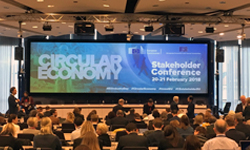 Circular economy is all about maximising the economic value of raw materials as long as possible, from the design of new products to effective sorting and recycling at the waste handlers. Circular economy cannot be achieved by separate players working in silos. Thus, the stakeholder collaboration is highly valuable. BusinessEurope recently joined the Circular Economy Stakeholder Platform of the European Commission and the European Economic and Social Committee (EESC) to help make the circular economy a reality in Europe.
Circular economy is all about maximising the economic value of raw materials as long as possible, from the design of new products to effective sorting and recycling at the waste handlers. Circular economy cannot be achieved by separate players working in silos. Thus, the stakeholder collaboration is highly valuable. BusinessEurope recently joined the Circular Economy Stakeholder Platform of the European Commission and the European Economic and Social Committee (EESC) to help make the circular economy a reality in Europe.
The ultimate goal is integrating the circular economy into the global value chains. The problem is that the traditional value chains, though incredibly efficient, still produce large amounts of waste. Nearly half of Europe’s waste still ends up being landfilled (source: 2014 EU waste statistics). That takes up space and could cause air, water and soil pollution. Only 9% of resources in today’s global economy are cycled back into use (source: 2018 Circular Economy Gap report)
We should make a business case out of circularity and reduce landfilling to zero as soon as possible. This requires the entire value chain, not just parts but the whole chain, to integrate circularity. After all, a value chain is only as strong as its weakest link.
How can the value chains be made more circular?
- Raise awareness on the benefits of going circular.
“Waste” is simply a term for materials ending up in the wrong place after use. Many European companies are already making a business case out of circularity – we collected about 110 of these examples on the European Circular Economy Industry Platform (www.circulary.eu). This helps us and others spread the word, so businesses around Europe can learn from their counterparts within their value chain or across value chains.
- Stimulate collaboration.
It’s rarely the case that an individual company can implement circularity alone, therefore they need to collaborate with others to overcome challenges. We piloted one way to do so at the annual Circular Economy Stakeholder Conference earlier this week. At the session “Bottom-up initiatives and concrete business cases” two companies presented their challenges to become more circular, after which stakeholder groups brainstormed about possible solutions.
Global cooperation matters as well. The first round of the Circular Supply Chain Accelerator was launched in Davos by the World Economic Forum and its partners to develop financing models and stimulate collaborations to scale up new initiatives. One novel way to accelerate circularity is having multinational companies formulate a demand for circular products or services, allowing their suppliers (oftentimes small- and medium-sized enterprises) to cater to such circular demands.
- Align policy goals and implementation.
Value chains know no geographic boundaries, and therefore need consistent policy across the EU borders to be fully functional. The EU is making headwinds in this regard by aligning definitions such as that of “secondary raw material” across the Member States. This is a first step to create new markets, but all Member States should focus on implementation. A first test case will be the reform of the Waste Framework Directive, which is in the final stage of negotiations.
BusinessEurope and our members will continue to work closely with businesses, EU institutions and stakeholder groups at large to ensure that these issues are addressed as soon as possible.
What future for transatlantic relations?
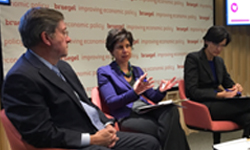 “The priority for European business is for the US to see the EU as a strategic partner. This is currently not the case and is highly problematic,” said Luisa Santos, Director for International Relations, at the event “Is there life after TTIP? The future of transatlantic economic relations”, organised by Bruegel on 19 February 2018. The debate opened with a presentation of Daniel Hamilton’s views on options for the future of transatlantic economic relations. Underlying that the EU and the US have a stake in each other, Mr Hamilton considers EU-US jobs and growth agreements a possible path towards healthy transatlantic relations versus a “path to nowhere” represented by the current wait and see strategy. Luisa Santos stated that the current US negative narrative based on trade deficits must leave place to a positive dynamic “while not an easy task, we need to put Europe back on the map by building on a positive agenda based on shared concerns and interests”.
“The priority for European business is for the US to see the EU as a strategic partner. This is currently not the case and is highly problematic,” said Luisa Santos, Director for International Relations, at the event “Is there life after TTIP? The future of transatlantic economic relations”, organised by Bruegel on 19 February 2018. The debate opened with a presentation of Daniel Hamilton’s views on options for the future of transatlantic economic relations. Underlying that the EU and the US have a stake in each other, Mr Hamilton considers EU-US jobs and growth agreements a possible path towards healthy transatlantic relations versus a “path to nowhere” represented by the current wait and see strategy. Luisa Santos stated that the current US negative narrative based on trade deficits must leave place to a positive dynamic “while not an easy task, we need to put Europe back on the map by building on a positive agenda based on shared concerns and interests”.
![]() Contact: Luisa Santos
Contact: Luisa Santos
Evidence-based legislation will help create a pro-innovation climate in Europe
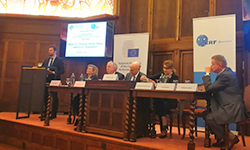 ‘Adopting an EU regulatory framework that is predictable and based on the best available science will fuel investments in innovation. This also requires to systematically consider the impact of policies on the ability to innovate.’ These key messages were stressed by BusinessEurope Senior Adviser Jan Bambas at the European Risk Forum conference co-organised by the Bulgarian Presidency on 20 February 2018 in Brussels. With the members of the European Parliament, the European Commission and the scientific community in the audience, Jan Bambas described concrete means to implement the innovation principle and better manage the risks in Europe on multiple levels. As a prerequisite, the scientific evidence will play a key role in the process to secure future-proof and sound political decisions. Using internal resources of the Commission and improving the transparency on methods and data used will enhance the process and assessments supporting the political decisions.
‘Adopting an EU regulatory framework that is predictable and based on the best available science will fuel investments in innovation. This also requires to systematically consider the impact of policies on the ability to innovate.’ These key messages were stressed by BusinessEurope Senior Adviser Jan Bambas at the European Risk Forum conference co-organised by the Bulgarian Presidency on 20 February 2018 in Brussels. With the members of the European Parliament, the European Commission and the scientific community in the audience, Jan Bambas described concrete means to implement the innovation principle and better manage the risks in Europe on multiple levels. As a prerequisite, the scientific evidence will play a key role in the process to secure future-proof and sound political decisions. Using internal resources of the Commission and improving the transparency on methods and data used will enhance the process and assessments supporting the political decisions.
Contact: Jan Bambas
Employability and skills are key areas for future EU investment
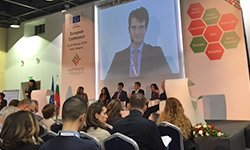 Improving people’s employment prospects and skills sets are key areas for European-level investment during the next budgetary period. In this vein, stronger conditionality is needed to ensure in the future that the projects receiving financial support from the European Social Fund (ESF) after 2020 contribute more than in the past to the implementation of the reform priorities agreed in the European semester. This was the main message of Social Affairs Director Maxime Cerutti at the Bulgarian Presidency conference "Investing in people - the way forward" that was held in Sofia on 16 February. In the future, the ESF should also play a greater role in building the capacity of national social partner organisations.
Improving people’s employment prospects and skills sets are key areas for European-level investment during the next budgetary period. In this vein, stronger conditionality is needed to ensure in the future that the projects receiving financial support from the European Social Fund (ESF) after 2020 contribute more than in the past to the implementation of the reform priorities agreed in the European semester. This was the main message of Social Affairs Director Maxime Cerutti at the Bulgarian Presidency conference "Investing in people - the way forward" that was held in Sofia on 16 February. In the future, the ESF should also play a greater role in building the capacity of national social partner organisations.
Contact: Robert Plummer
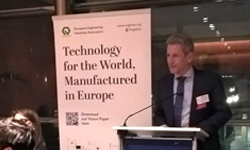 Effective market surveillance in the Single Market
Effective market surveillance in the Single Market
Paul Coebergh van den Braak, Chair of BusinessEurope’s Free Movement of Goods Working Group, spoke on behalf of BusinessEurope during a dinner debate in the European Parliament on 21 February 2018. The event concerned the European Commission’s proposal for a new Regulation on Compliance and Enforcement from the December 2017 Goods Package. “Strong market surveillance is necessary, and we welcome the proposed Regulation’s goal of creating a level playing field with fair competition,” said Mr Van den Braak. “In order to achieve this, market surveillance authorities need adequate powers. However, these powers should be balanced by safeguards for proportional use and confidentiality.” The legislative proposals from the Goods Package are currently being discussed in the European Parliament and Council. BusinessEurope is preparing a position paper on the Package.
![]()
![]() Contact: Basje Bender
Contact: Basje Bender
EU Collective redress: safeguards are a must
 Businesses expect no less than strict procedural safeguards against frivolous claims in the future Commission collective redress initiative. The 2013 recommendation on collective redress already provided minimum standards welcomed by all stakeholders. Only then will Europe be able to avoid importing an abusive litigation witnessed in other parts of the world. Collective litigation, while appealing on paper, does not necessarily bring the best results for consumers nor companies. This is reflected in a recent US Financial Protection Bureau study showing that lawyers are the real winners in US class actions. For consumers, class actions represent an average recovery of $32 whilst for a lawyer the average amount is around $1 million. These messages were voiced by Legal Affairs Director Pedro Oliveira at the European Parliament Legal Affairs Committee hearing on collective redress.
Businesses expect no less than strict procedural safeguards against frivolous claims in the future Commission collective redress initiative. The 2013 recommendation on collective redress already provided minimum standards welcomed by all stakeholders. Only then will Europe be able to avoid importing an abusive litigation witnessed in other parts of the world. Collective litigation, while appealing on paper, does not necessarily bring the best results for consumers nor companies. This is reflected in a recent US Financial Protection Bureau study showing that lawyers are the real winners in US class actions. For consumers, class actions represent an average recovery of $32 whilst for a lawyer the average amount is around $1 million. These messages were voiced by Legal Affairs Director Pedro Oliveira at the European Parliament Legal Affairs Committee hearing on collective redress.
![]() Contact: Pedro Oliveira
Contact: Pedro Oliveira
Multilateral Investment Court – How to create a viable project
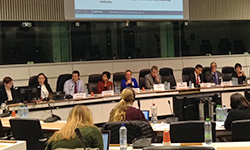 Speaking at the public hearing organised in the context of the European Economic and Social Committee (EESC) Opinion on the Multilateral Investment Court, that took place on 20 February 2018, Luisa Santos, International Relations Director at BusinessEurope, said: “We see the initiative to establish a Multilateral Investment Court as part of the efforts to modernise and streamline investor-state dispute settlement. In this regard, we are ready to contribute with expertise to ensure that the new system is effective and accessible to companies of all sizes”. Launched as part of the trade package presented in the framework of the State of the Union speech of September 2017, the proposal to set up a Multilateral Investment Court supports a new system for resolving disputes between foreign investors and states. Its aim is to address concerns and shortcomings of the current system, for instance by improving its legitimacy, consistency and transparency. The Commission proposes that negotiations should be launched under the auspices of the UN Commission on International Trade Law (UNCITRAL). Although some stakeholders criticise the fact that the Commission’s proposal only covers the procedural aspects of investor-state dispute settlement, and not the substantive investment provisions. BusinessEurope is of the view that a step-by-step, realistic approach may in this case be more effective.
Speaking at the public hearing organised in the context of the European Economic and Social Committee (EESC) Opinion on the Multilateral Investment Court, that took place on 20 February 2018, Luisa Santos, International Relations Director at BusinessEurope, said: “We see the initiative to establish a Multilateral Investment Court as part of the efforts to modernise and streamline investor-state dispute settlement. In this regard, we are ready to contribute with expertise to ensure that the new system is effective and accessible to companies of all sizes”. Launched as part of the trade package presented in the framework of the State of the Union speech of September 2017, the proposal to set up a Multilateral Investment Court supports a new system for resolving disputes between foreign investors and states. Its aim is to address concerns and shortcomings of the current system, for instance by improving its legitimacy, consistency and transparency. The Commission proposes that negotiations should be launched under the auspices of the UN Commission on International Trade Law (UNCITRAL). Although some stakeholders criticise the fact that the Commission’s proposal only covers the procedural aspects of investor-state dispute settlement, and not the substantive investment provisions. BusinessEurope is of the view that a step-by-step, realistic approach may in this case be more effective.
Contact: Sofia Bournou
EU should reduce costs of cross-border payments
 BusinessEurope’s Director General Markus J. Beyrer wrote to European Commission Vice-President Valdis Dombrovskis to support the reduction of costs for cross-border payments in the EU. He stated that the free flow of capital is a fundamental pillar of the European Single Market. It must be maintained and enhanced where possible to ensure the efficient functioning of capital markets in the EU. A prerequisite for achieving this is to ensure that cross-border transactions within the EU can be completed efficiently and for a low-cost across all Member States to strengthen intra-EU trade.
BusinessEurope’s Director General Markus J. Beyrer wrote to European Commission Vice-President Valdis Dombrovskis to support the reduction of costs for cross-border payments in the EU. He stated that the free flow of capital is a fundamental pillar of the European Single Market. It must be maintained and enhanced where possible to ensure the efficient functioning of capital markets in the EU. A prerequisite for achieving this is to ensure that cross-border transactions within the EU can be completed efficiently and for a low-cost across all Member States to strengthen intra-EU trade.
![]() Contact: Erik Berggren
Contact: Erik Berggren
Better implementation of public procurement rules is key
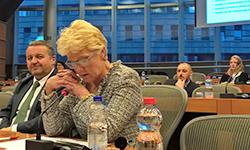 “It is key that public procurement rules are properly implemented in the Single Market, because companies still face problems in competing for public tenders.” This was the message conveyed by Arnhild D. Gjønnes, Chair of BusinessEurope’s Public Contracts Working Group, during a workshop in the European Parliament (EP). The event was organised to prepare for an EP Committee on Internal Market and Consumer Protection (IMCO) report on the European Commission’s non-legislative Public Procurement Package from October 2017. “The Public Procurement Package provides a number of helpful soft law measures to improve this situation,” added Ms Gjønnes. She also stressed that social considerations, while in itself legitimate, should approached with a certain caution because of the cross-border barriers these may create in practice. BusinessEurope is currently preparing a position paper on the non-legislative package.
“It is key that public procurement rules are properly implemented in the Single Market, because companies still face problems in competing for public tenders.” This was the message conveyed by Arnhild D. Gjønnes, Chair of BusinessEurope’s Public Contracts Working Group, during a workshop in the European Parliament (EP). The event was organised to prepare for an EP Committee on Internal Market and Consumer Protection (IMCO) report on the European Commission’s non-legislative Public Procurement Package from October 2017. “The Public Procurement Package provides a number of helpful soft law measures to improve this situation,” added Ms Gjønnes. She also stressed that social considerations, while in itself legitimate, should approached with a certain caution because of the cross-border barriers these may create in practice. BusinessEurope is currently preparing a position paper on the non-legislative package.
Contact: Basje Bender
Calendar
- 22-23 February: Second European Industry Day
- 23 February: Informal meeting of Heads of State or Government
- 23-24 February: Informal European Council
- 28 February: European Semester Winter Package
- 28 February: Posting of workers trilogue meeting
- 1 March: BUSINESSEUROPE Day 2018 (upon invitation)
- 4 March: Italian elections